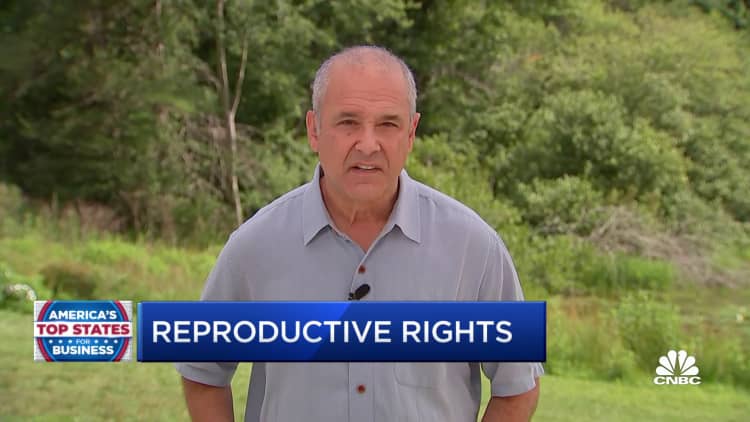Supporters of Ohio Issue 1 cheer as results come in at a watch party hosted by Ohioans United for Reproductive Rights on November 7, 2023 in Columbus, Ohio.
Andrew Spear | Getty Images News | Getty Images
Ohio voters have added the right to access abortion care to the state’s constitution, NBC News projects — another major political victory for abortion-rights advocates in the nearly 17 months since the Supreme Court struck down Roe v. Wade.
The passage of the Issue 1 ballot measure inserts language in the state constitution guaranteeing every person in Ohio the right “to one’s own reproductive medical treatment, including but not limited to abortion,” and barring the state from “burdening, penalizing or prohibiting” those rights — though it specifies that abortion will remain prohibited after the point a doctor judges a fetus would most likely survive birth, with exceptions to protect the woman’s life or health.
Approval of the ballot measure marks yet another victory for abortion-rights advocates, this time in a state that Donald Trump twice carried by 8-point margins. Since the Supreme Court overturned Roe v. Wade and the national right to abortion access in its June 2022 Dobbs decision, ballot measures backing abortion rights have won in every election so far, even in conservative states, including Kentucky and Kansas — and in an August special election in Ohio that served as a proxy battle ahead of November’s constitutional amendment fight.
Tuesday’s outcome further demonstrates that abortion could remain a major liability for Republicans in elections. As in Ohio, polling has shown that voters across the country broadly favor abortion protections — a fact that Democrats leveraged last year to keep control of the U.S. Senate, fend off a red wave in the House and win several governorships. Next year, it is likely to be central to President Joe Biden’s campaign for re-election.
In Ohio, passage of the amendment will effectively counteract the state’s “heartbeat bill,” which took effect immediately after the Dobbs decision and banned most abortions — with exceptions for the health of the pregnant woman and ectopic pregnancies — but remains temporarily blocked by a state judge.
That case is before the state Supreme Court, which heard oral arguments in September.
Groups on both sides of the abortion fight spent millions in the run-up to an August election in Ohio — another ballot measure campaign, that one over whether to make it harder to amend the state constitution in the future, including raising the threshold for success to 60% instead of a simple majority. It lost in August. Its resounding defeat was a clear win for reproductive rights advocates in Ohio, and in many ways it paved the way for the success of the measure approved Tuesday.

Following that campaign, reproductive rights groups began far outspending anti-abortion groups in the fight over the November measure.
Since Aug. 9, groups supporting the November Issue 1 measure spent $23.7 million on advertising, compared to $10.7 million the anti-abortion groups spent against the amendment, according to AdImpact, a firm that tracks political ad spending.

